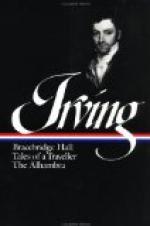This was the “be all and the end all” of my fortune. I no longer hesitated what to do. Egad, thought I, since stealing is the order of the day, I’ll steal too. So I secretly gathered together the jewels of my wardrobe; packed up a hero’s dress in a handkerchief, slung it on the end of a tragedy sword, and quietly stole off at dead of night—“the bell then beating one,”—leaving my queen and kingdom to the mercy of my rebellious subjects, and my merciless foes, the bum-bailiffs.
Such, sir, was the “end of all my greatness.” I was heartily cured of All passion for governing, and returned once more into the ranks. I had for some time the usual run of an actor’s life. I played in various country theatres, at fairs, and in barns; sometimes hard pushed; sometimes flush, until on one occasion I came within an ace of making my fortune, and becoming one of the wonders of the age.
I was playing the part of Richard the Third in a country barn, and Absolutely “out-Heroding Herod.” An agent of one of the great London theatres was present. He was on the lookout for something that might be got up as a prodigy. The theatre, it seems, was in desperate condition—nothing but a miracle could save it. He pitched upon me for that miracle. I had a remarkable bluster in my style, and swagger in my gait, and having taken to drink a little during my troubles, my voice was somewhat cracked; so that it seemed like two voices run into one. The thought struck the agent to bring me out as a theatrical wonder; as the restorer of natural and legitimate acting; as the only one who could understand and act Shakespeare rightly. He waited upon me the next morning, and opened his plan. I shrunk from it with becoming modesty; for well as I thought of myself, I felt myself unworthy of such praise.
“’Sblood, man!” said he, “no praise at all. You don’t imagine that I think you all this. I only want the public to think so. Nothing so easy as gulling the public if you only set up a prodigy. You need not try to act well, you must only act furiously. No matter what you do, or how you act, so that it be but odd and strange. We will have all the pit packed, and the newspapers hired. Whatever you do different from famous actors, it shall be insisted that you are right and they were wrong. If you rant, it shall be pure passion; if you are vulgar, it shall be a touch of nature. Every one shall be prepared to fall into raptures, and shout and yell, at certain points which you shall make. If you do but escape pelting the first night, your fortune and the fortune of the theatre is made.”
I set off for London, therefore, full of new hopes. I was to be the restorer of Shakespeare and nature, and the legitimate drama; my very swagger was to be heroic, and my cracked voice the standard of elocution. Alas, sir! my usual luck attended me. Before I arrived in the metropolis, a rival wonder had appeared. A woman who could dance the slack rope, and run up a cord from the stage to the gallery with fire-works all round her. She was seized on by the management with avidity; she was the saving of the great national theatre for the season. Nothing was talked of but Madame Saqui’s fire-works and flame-colored pantaloons; and nature, Shakespeare, the legitimate drama, and poor Pillgarlick were completely left in the lurch.




